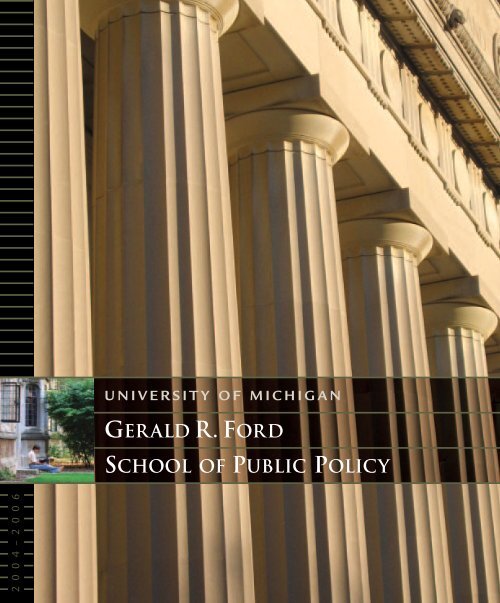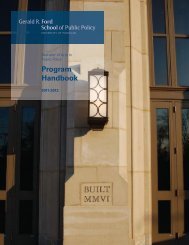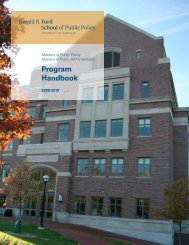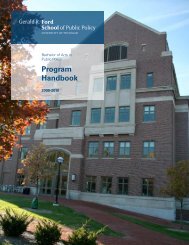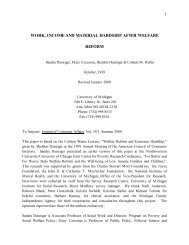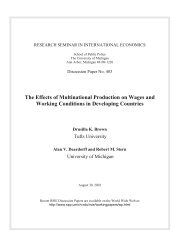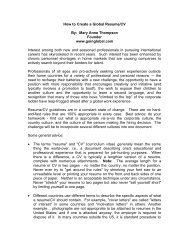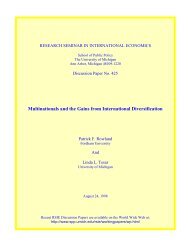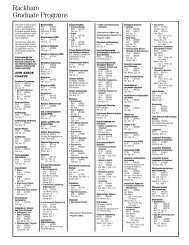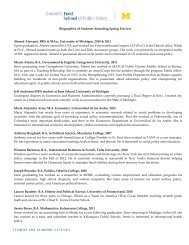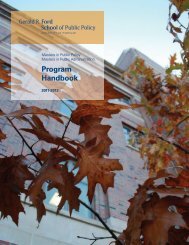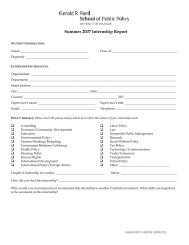SPP Brochure 8-04 - Gerald R. Ford School of Public Policy ...
SPP Brochure 8-04 - Gerald R. Ford School of Public Policy ...
SPP Brochure 8-04 - Gerald R. Ford School of Public Policy ...
Create successful ePaper yourself
Turn your PDF publications into a flip-book with our unique Google optimized e-Paper software.
ABOUT THE SCHOOL 3The Mission <strong>of</strong> the <strong>School</strong>Founded in 1914 as the Institute for <strong>Public</strong>Administration, today the <strong>Gerald</strong> R. <strong>Ford</strong> <strong>School</strong><strong>of</strong> <strong>Public</strong> <strong>Policy</strong> is one <strong>of</strong> the top-ranked publicpolicy programs in the United States. Drawingon the University <strong>of</strong> Michigan’s internationalreputation as a leading center for social science research,the <strong>Ford</strong> <strong>School</strong> <strong>of</strong>fers graduate and pr<strong>of</strong>essional educationfor those planning careers focused on public issues.The school was named in 1999 for <strong>Gerald</strong> R. <strong>Ford</strong>,the 38th President <strong>of</strong> the United States and a 1935 graduate<strong>of</strong> the University <strong>of</strong> Michigan. The mission <strong>of</strong> theschool is to <strong>of</strong>fer outstanding education for leadershipin public policy analysis and public management and toexcel in social science research that illuminates publicissues and promotes better public policy. Our goal isthree-fold, to provide education, research, and service,and these depend on each other. Teaching and publicservice pose challenges that sharpen and strengthen ourresearch agenda. Research enriches the education we provideand guides our direct contributions to public service.Through rigorous training <strong>of</strong> policy analysts and publicmanagers, we seek to improve the quality <strong>of</strong> deliberationabout public policy. We believe the <strong>Ford</strong> <strong>School</strong> mission isbest pursued by an interdisciplinary group <strong>of</strong> faculty whomeet the criteria <strong>of</strong> academic excellence in the socialscience disciplines, who push beyond the boundaries <strong>of</strong>those disciplines, and who take seriously the implications<strong>of</strong> their work for policy problems.The program is interdisciplinary, designed to preparestudents to work in the increasingly complex world <strong>of</strong> policyanalysis and public management. The <strong>School</strong> providesstrong training in both domestic U.S. policy and in internationalpolicy and includes rigorous work in methodologiesthat enable graduates to analyze and evaluate the effects“The <strong>Ford</strong> <strong>School</strong> draws people whocombine a deep desire to make theworld a better place with a sharp eyetoward intellectual analysis.The passionateconversations about policystem from a love <strong>of</strong> the subject, not a desire to pontificateor argue for argument’s sake. Teachers and students alikeapproach the subject matter with a combination <strong>of</strong> academicrigor and a personal humility that creates a wonderfullearning environment.” — Mark Wallace, MPP 20<strong>04</strong>Former Detroit mayor Dennis Archer addresses a <strong>Ford</strong> <strong>School</strong> class.F ORD SCHOOL OF PUBLIC POLICY
4 ABOUT THE SCHOOLLife at the <strong>Ford</strong> <strong>School</strong><strong>of</strong> public policy decisions. The program is quite flexible,providing training that focuses on economic, political,organizational, and quantitative analysis. Students areencouraged to develop areas <strong>of</strong> specialization and havethe extensive resources <strong>of</strong> the University <strong>of</strong> Michiganfrom which to develop their programs <strong>of</strong> study.The faculty, many <strong>of</strong> whom hold joint appointmentswith other academic departments, is among the strongestin the field. Faculty members are distinguished by theiracademic research and enthusiastic teaching as well as bytheir active participation in the practice <strong>of</strong> public policy.With a student body <strong>of</strong> about 165 Masters studentsand 35 Ph.D. students, the <strong>School</strong> is large enough to <strong>of</strong>ferdiversity <strong>of</strong> intellectual and political interests while smallenough to be friendly and comfortable. The full range <strong>of</strong>graduate coursework at the University <strong>of</strong> Michigan is availableto <strong>Ford</strong> <strong>School</strong> students. Michigan has a strong tradition<strong>of</strong> interdisciplinary work and students are encouragedto follow that tradition in pursuing their policy interestsin areas that range from Asian Studies to Urban Planning.A foundation <strong>of</strong> core courses in the <strong>School</strong> preparesstudents for the elective portion <strong>of</strong> their graduate work.In addition to rigorous academic training, the <strong>Ford</strong><strong>School</strong> believes students should learn about the realworld context in which policy decisions are made andimplemented. Students are <strong>of</strong>fered a variety <strong>of</strong> classroomand hands-on opportunities to work in government andcommunity organizations, developing a sense <strong>of</strong> the manyfactors that converge in policymaking.Distinguished policy practitioners are frequent visitorson campus. Diplomats, elected <strong>of</strong>ficials, and public mangersfrom around the world all bring their perspectives to theschool through special courses, guest lectures, classroomvisits, and discussion sessions.The informal and friendly atmosphere <strong>of</strong> the <strong>School</strong>encourages students to get to know one another, the faculty,and the school’s alumni. From this rich mix <strong>of</strong> experience,students learn about the policymaking world and areextremely well prepared to enter that world as skilledand effective participants.The <strong>Ford</strong> <strong>School</strong> is home to an energetic studentbody that takes an active role in the life <strong>of</strong> the <strong>School</strong>,organizing activities that range from community serviceprojects to hosting policymakers, to social activities.Students also play an important role in the governance<strong>of</strong> the <strong>School</strong>, serving on the Admissions, Curriculum,and Executive Committees.FORD SCHOOL STUDENT ORGANIZATIONSAssociation for <strong>Public</strong> <strong>Policy</strong>, Learning, andEducation (APPLE)Community Service OrganizationEnvironmental <strong>Policy</strong> Student GroupInternational <strong>Policy</strong> Students AssociationMichigan Journal <strong>of</strong> <strong>Public</strong> AffairsSocial CommitteeStudent Affairs CommitteeStudents <strong>of</strong> Color in <strong>Public</strong> <strong>Policy</strong>Women and Gender in <strong>Public</strong> <strong>Policy</strong>To learn more about student organizationsat the school, visit our website,www.fordschool.umich.edu and followlinks to the prospective students section.WWW.FORDSCHOOL.UMICH.EDU
ABOUT THE SCHOOL 5Living in Ann ArborAnn Arbor is a vibrant and cosmopolitan place inwhich to live, work, and play. Home to some <strong>of</strong> thenation’s finest spectator sports and entertainmentevents as well as an exciting array <strong>of</strong> cafes, comedy clubs,art fairs, museums, theaters, restaurants, and recreationcenters, the city boasts all the trappings <strong>of</strong> a majormetropolis while retaining the familiarity <strong>of</strong> a collegetown. Yet unlike most college towns, Ann Arbor, throughthe University Musical Society, is one <strong>of</strong> the top five presenters<strong>of</strong> performing arts in the country. The area hasmore than 20 museums <strong>of</strong> art, science, and history andhosts summer art and jazz festivals that attract more than1,000,000 visitors annually.Ann Arbor is easily accessible by air, train, bus, andcar. The city is about ninety minutes from Boston, NewYork, and Washington by plane. It is thirty miles fromDetroit’s international airport and forty-five miles fromdowntown Detroit. Chicago and Toronto are just a fourhourride by train or car. For more information aboutAnn Arbor, visit www.arborweb.com.The Ann Arbor Street Art Fairs attract hundreds <strong>of</strong> thousands <strong>of</strong> people everyJuly (above). From intimate jazz at the Firefly Club to the Berlin Philharmonicat Hill Auditorium, Ann Arbor plays host to a variety <strong>of</strong> cultural events yearround,including films at the historic Michigan Theater (right).F ORD SCHOOL OF PUBLIC POLICY
6 ABOUT THE SCHOOLGrowth <strong>of</strong> the <strong>School</strong>In 1999, the <strong>Ford</strong> <strong>School</strong> began a period <strong>of</strong> growththat coincided with the naming <strong>of</strong> the <strong>School</strong> forPresident <strong>Ford</strong>. With strong support from theUniversity, the school added new academic and outreachprograms, nearly doubled the size <strong>of</strong> its faculty, substantiallyincreased funding for students, and began planninga move into its own building.Faculty growth and program development are closelytied and each has benefited from private philanthropicsupport. Recent gifts have endowed pr<strong>of</strong>essorships to supportresearch on broad issues <strong>of</strong> public policy and in educationpolicy. Prominent faculty have, in turn, helped theschool to develop innovative programs such as DistanceLearning Project for Quantitative Social Science, a programthat is training a new generation <strong>of</strong> policy researchers inSouth Africa.Financial support is critical to students as they preparefor their careers. Friends and alumni <strong>of</strong> the school haveprovided funding for both fellowships and internships.This funding enables students to make educational decisionsbased on their career goals rather than financialneed.<strong>Public</strong> lectures and events are an important part <strong>of</strong> apolicy program at a public university. Support from foundationsand individuals has helped the school to fulfill thisresponsibility. With ongoing support for such activities,the <strong>Ford</strong> <strong>School</strong> organizes lectures, symposia, and conferenceson topics such as the role <strong>of</strong> the United Nations ininternational crises, healthcare for the uninsured, privacyin the information age, and educational segregation andachievement.The rapid expansion <strong>of</strong> the <strong>Ford</strong> <strong>School</strong> has pushedcurrent facilities to their limit. Currently housed in threebuildings on the U-M central campus, construction on the<strong>Ford</strong> school’s new home, Joan and Sanford Weill Hall, willbegin in the fall <strong>of</strong> 20<strong>04</strong>. Located at the southern entranceto the main campus, the building, when completed in2006, will bring all <strong>of</strong> the <strong>School</strong>’s programs and servicestogether in one place and will provide space for publicevents and for quiet study and informal conversation.James Levinsohn is the J. Ira and NickiHarris Family Pr<strong>of</strong>essor <strong>of</strong> <strong>Public</strong> <strong>Policy</strong>Richard Holbrooke, former U.S.Ambassador to the United Nations,delivered the Citigroup Lecture in 2003.WWW.FORDSCHOOL.UMICH.EDU
Joan and Sanford Weill HallABOUT THE SCHOOL 7COMMITTEE FOR THE FORD SCHOOLThe Committee for the <strong>Ford</strong> <strong>School</strong> provides the <strong>School</strong> withadvice and counsel on matters related to program growth andexpansion. Its members include:Martin J. Allen, Jr.<strong>Gerald</strong> R. <strong>Ford</strong> FoundationGrand Rapids, MIAkinari HoriiBank <strong>of</strong> JapanTokyo, JapanJohn J.H. SchwarzPhysicianBattle Creek, MIPeter F. Borish, MPP 1982One ChicagoNew York, NYJames B. Hudak, MPP 1971United Behavioral HealthSan Francisco, CAAllen SinaiPrimark Decision EconomicsNew York, NYFrederick O. Brown, MPP 1996Treystar HoldingsPortage, MIHendrick G. MeijerMeijer, Inc.Grand Rapids, MIMichael B. StaeblerPepper Hamilton LLPDetroit, MISusan C. BrownKalamazoo, MIMartha A. DarlingAnn Arbor, MIJudith C. FreyThe Issues Network GroupGrand Rapids, MILyman HamiltonCarmel, CARichard W. OdgersPillsbury Winthrop LLPSan Francisco, CAMargaret Ann (Ranny) RieckerThe Harry A. and Margaret D. TowsleyFoundationHerbert H. and Grace A. Dow FoundationMidland, MIFrank ZarbHellman and FriedmanNew York, NYPresident <strong>Ford</strong> speaking on campus.F ORD SCHOOL OF PUBLIC POLICY
RECENT FORD SCHOOL VISITORSMadeline AlbrightU.S. Secretary <strong>of</strong> State 1997–2001Oscar AriasNobel Peace Prize LaureateDennis ArcherMayor <strong>of</strong> Detroit 1994–2000Samuel BergerNational Security Advisor 1996–2000Catherine BertiniDirector, World Food Program1992–2002Kenneth BurnleyCEO, Detroit <strong>Public</strong> <strong>School</strong>sJohn DingellU.S. House <strong>of</strong> RepresentativesVernon EhlersU.S. House <strong>of</strong> Representatives<strong>Gerald</strong> <strong>Ford</strong>President <strong>of</strong> the United States 1974–76Harold <strong>Ford</strong>, Jr.U.S. House <strong>of</strong> RepresentativesDebra Fraser-HowzeNational Black Leadership Council onAIDSGail GilbertU.S. Joints Chiefs <strong>of</strong> StaffRichard HolbrookeU.S Ambassador to the United Nations1999–2000Joseph JohnsonU.S. Department <strong>of</strong> Education,1997–2000Michael S. KantorSecretary <strong>of</strong> Commerce 1994–1996Kwame KilpatrickMayor <strong>of</strong> DetroitPaul KrugmanThe New York TimesAndrew LadleyU.N. Office in East TimorSteven LewisU.N. Special Representative onHIV/AIDSCarl LevinU.S. SenateClockwise from upper left: Namanga Ngongi, Robin Wright, Paul O’NeillNamanga NgongiU.N. Special Representative to theDemocratic Republic <strong>of</strong> CongoPaul O’NeillSecretary <strong>of</strong> the Treasury 2001–2002Brent Scowcr<strong>of</strong>tNational Security Advisor 1974–76,1988–92Lawrence SummersSecretary <strong>of</strong> the Treasury 1999–2000Frank Von HippelFederation <strong>of</strong> American ScientistsRobin WrightThe Los Angeles TimesVisitors andSpecial OpportunitiesEach year the <strong>Ford</strong> <strong>School</strong> hosts policy practitionerswho have worked at various levels <strong>of</strong> government,in national and international organizations, or whowork at the intersection <strong>of</strong> public and private concerns.Some visitors spend a semester on campus teaching.Others visit to give lectures and seminars and to meet withstudents about policy and career interests. Students havefrequent opportunities to meet informally with visitors toexplore topics <strong>of</strong> mutual interest.The <strong>Ford</strong> <strong>School</strong> <strong>of</strong>fers several programs that enrichour academic program by giving students opportunitiesfor close interaction with policymakers and by providinghands-on experience in the policymaking world. Programsvary from year to year. Some <strong>of</strong> the current and/or recentopportunities are listed below.Special Courses in 20<strong>04</strong>–05Barbara Freese was Assistant Attorney General <strong>of</strong>Minnesota 1986–1999. In that capacity she had responsibilityfor overseeing implementation <strong>of</strong> the Clean Air Act.In the fall <strong>of</strong> 20<strong>04</strong>, she will teach a class on environmentalpolicy, looking at the policy challenges <strong>of</strong> moving beyondfossil fuels.Sharon Rothwell was Chief <strong>of</strong> Staff for Governor JohnEngler <strong>of</strong> Michigan for twelve years. In fall 20<strong>04</strong> she willteach Human Resource Management in the <strong>Public</strong> Sector.Renmin University Visiting Faculty — The <strong>Ford</strong> <strong>School</strong>is pleased to have faculty from the <strong>School</strong> <strong>of</strong> <strong>Public</strong>Administration in Beijing teaching here on a regular basis.Visitors in 20<strong>04</strong>–05 will be Dr. S. Yinhong, teaching a classon Chinese foreign policy, and Dr. X. Guangjian, who willteach a course on Chinese economic reform policy.WWW.FORDSCHOOL.UMICH.EDU
ABOUT THE SCHOOL 9Outreach OpportunitiesThe Applied <strong>Policy</strong> Seminar (APS)The APS is a regular part <strong>of</strong> the <strong>Ford</strong> <strong>School</strong> curriculum.Students in the course are assigned to one <strong>of</strong> a number <strong>of</strong>projects with local units <strong>of</strong> government. Frequently thesecourses focus on a proposed policy change and examinethe costs and benefits <strong>of</strong> such a change. Recent projectshave included studying the feasibility <strong>of</strong> city-sponsoredrecycling in Bay City, Michigan, development <strong>of</strong> a comprehensivecommercial development plan for areas adjacentto the UM campus, and exploration <strong>of</strong> privatization <strong>of</strong>municipal parking in Ann Arbor.The Integrated <strong>Policy</strong> Exercise (IPE)The IPE is a school-wide policy simulation held in Januaryeach year. In 20<strong>04</strong>, the IPE focused on urban revitalizationin a metropolitan context, looking particularly atDetroit, Michigan. The Detroit metropolitan area is astudy in contrasts. The 2000 U.S. Census found Detroit tobe one <strong>of</strong> the nation’s most racially and economically segregatedmetropolitan areas. Fifty years <strong>of</strong> flight from thecity has led to a host <strong>of</strong> economic and infrastructure problemswhile suburban areas enjoy the benefits <strong>of</strong> the newtechnology economy. The IPE studied a proposal to convertthe State Fairgrounds (a site <strong>of</strong> 200 acres) in Detroitto a regional park, under the authority <strong>of</strong> a regional parkbureau. Competing proposals, such as private development<strong>of</strong> the site or the transfer <strong>of</strong> ownership to the city,were considered. Students evaluated these proposals fromthe perspective <strong>of</strong> various stakeholders and final reportswere shared with state and local policymakers. The 2003IPE focused on the development <strong>of</strong> the Global AIDS Fundand brought speakers from the United Nations, majorpharmaceutical firms, governments, and activist organizationsto campus to talk with students.Distance Learning Project for Quantitative Social ScienceThis is an ongoing program to provide assistance tosocial science researchers in South Africa as they developdata archives and the skill to use them in policymaking.Students do much <strong>of</strong> the work through web-based informationsharing and make a trip to South Africa in January/February to work directly with social scientists there.Developing Country TourEach year the International <strong>Policy</strong> Students Association(IPSA) works with a <strong>Ford</strong> <strong>School</strong> faculty member to plana trip to a developing country during the late-Februaryvacation. Through the course, Economic and SocialPolicies <strong>of</strong> a Selected Developing Country, students developtheir knowledge <strong>of</strong> a country. Drawing on the expertise<strong>of</strong> faculty from across the UM campus, students study theeconomics, politics, sociology, and culture <strong>of</strong> the selectedcountry. The student group and faculty sponsors thenvisit the country for 8–10 days to meet with policymakers,opposition leaders, non-pr<strong>of</strong>it organizations, and journalists.In 20<strong>04</strong> the course focused on Cuba.International <strong>Policy</strong> ResourcesThe University has a wide array <strong>of</strong> internationally focusedresearch and teaching programs. The InternationalInstitute in home to many <strong>of</strong> these and full descriptions<strong>of</strong> the activities available to students can be found onthe Institute’s website: www.umich.edu/~iinet. OtherU-M <strong>of</strong>fices, such as the Center for International andComparative Law, the Population Studies Center, andthe William Davidson Institute also provide programs<strong>of</strong> interest to policy students.F ORD SCHOOL OF PUBLIC POLICY
ABOUT THE SCHOOL 11Research CentersThe <strong>Ford</strong> <strong>School</strong> is home to several major researchcenters focusing on policy issues. All are collaborativeefforts involving faculty from across the U-Mcampus and reflecting the strong commitment to interdisciplinarywork found on campus. <strong>Ford</strong> <strong>School</strong> faculty andstudents are affiliated with each center through researchprojects, courses, and informal discussion groups. Moreinformation about each <strong>of</strong> these centers is available atwww.fordschool.umich.edu/research.Center for Local, State, and Urban <strong>Policy</strong>Established in 1999, the Center’s mission is to foster society’sunderstanding <strong>of</strong> the policy issues facing states, cities,and metropolitan areas and to seek effective solutions tothem. Recent research at the Center has focused on landuse and on privatization <strong>of</strong> public services.National Poverty CenterFunded by the U.S. Department <strong>of</strong> Health and HumanServices, the NPC fosters multi-disciplinary research onpoverty and poverty-related policy in the United States,trains researchers, and disseminates its findings to thepolicy and research communities.Nonpr<strong>of</strong>it and <strong>Public</strong> Management CenterNPM is focused on improving education and research onthe management <strong>of</strong> public and nonpr<strong>of</strong>it organizations.It provides training to pr<strong>of</strong>essional school students whoplan careers in this field or who anticipate substantialinvolvement through volunteer service to nonpr<strong>of</strong>its andit conducts research on the distinctive roles and contributions<strong>of</strong> the nonpr<strong>of</strong>it sector.Research and Training Program on Povertyand <strong>Public</strong> <strong>Policy</strong>The program provides the opportunity for one to twoyears <strong>of</strong> research and extensive training at the University<strong>of</strong> Michigan to outstanding American scholars who aremembers <strong>of</strong> groups that are underrepresented in thesocial sciences (e.g. members <strong>of</strong> racial and ethnic minoritygroups, individuals from socio-economically disadvantagedbackgrounds, etc.) The program is made possible bygrants from the <strong>Ford</strong> Foundation.Michigan Program on Poverty andSocial Welfare <strong>Policy</strong>Since its creation in 1995, this program has worked topromote interdisciplinary research on the effects <strong>of</strong>poverty on families and communities, to evaluate welfarereform, examine the practices <strong>of</strong> social service agencies,and share findings with researchers and public policydecision-makers.“I came to the <strong>Ford</strong> <strong>School</strong>because <strong>of</strong> its strength inquantitative analysis. I haverealized that not only haveI developed this skill setthrough work with my pr<strong>of</strong>essors, but I havegained vast knowledge and skills from my classmateswho come from many diverse careers andbackgrounds. I can see, in my internship withthe City <strong>of</strong> Detroit, how useful the skills I haveobtained, both inside the classroom and frommy peers, are in the real world <strong>of</strong> policymaking.”— Romonda McKinney, MPP 2005F ORD SCHOOL OF PUBLIC POLICY
FacultyAxelrodBlankChamberlinCharlesChenCohenRobert Axelrod is Arthur W. Bromage DistinguishedUniversity Pr<strong>of</strong>essor <strong>of</strong> Political Science and <strong>Public</strong><strong>Policy</strong>. His areas <strong>of</strong> specialization include internationalsecurity, formal models, and complex adaptivesystems. Bob’s books include Conflict <strong>of</strong> Interest,The Structure <strong>of</strong> Decision, The Evolution <strong>of</strong> Cooperation,and The Complexity <strong>of</strong> Cooperation. His work focuseson questions <strong>of</strong> how patterns <strong>of</strong> social behavioremerge and draws on current research in a widerange <strong>of</strong> disciplines, including biology, psychology,and computer science. He is the winner <strong>of</strong> severalnational awards and was named a MacArthurFellow. He is a graduate <strong>of</strong> the University <strong>of</strong>Chicago and received his Ph.D. from Yale University.Rebecca M. Blank is Dean <strong>of</strong> the <strong>Ford</strong> <strong>School</strong> <strong>of</strong><strong>Public</strong> <strong>Policy</strong>, the Henry Carter Adams CollegiatePr<strong>of</strong>essor <strong>of</strong> <strong>Public</strong> <strong>Policy</strong>, and Pr<strong>of</strong>essor <strong>of</strong>Economics. She also serves as co-director <strong>of</strong> theNational Poverty Center. Her research focuses onthe interaction between the macroeconomy, governmentanti-poverty programs, and the behaviorand well-being <strong>of</strong> low-income families. Her publicationsinclude It Takes a Nation: A New Agenda forFighting Poverty, Finding Jobs: Work and Welfare Reform,and Is the Market Moral? Becky joined the facultyafter serving as a Member <strong>of</strong> the President’sCouncil <strong>of</strong> Economic Advisers in Washington,D.C. A graduate <strong>of</strong> the University <strong>of</strong> Minnesota,she received her Ph.D. from the MassachusettsInstitute <strong>of</strong> Technology.John R. Chamberlin is Pr<strong>of</strong>essor <strong>of</strong> Political Scienceand <strong>Public</strong> <strong>Policy</strong>. His research interests includelocal government accountability, legislative re-districting,representation and elections, and ethicsand public policy. At the <strong>Ford</strong> <strong>School</strong>, he teachesValues, Ethics and <strong>Public</strong> <strong>Policy</strong>, <strong>Policy</strong> andManagement in the Nonpr<strong>of</strong>it Sector, AppliedRegression Analysis, and the Applied <strong>Policy</strong> Seminar.He is a graduate <strong>of</strong> Lehigh University and receivedhis Ph.D. from the Graduate <strong>School</strong> <strong>of</strong> Businessat Stanford University. John joined the Michiganfaculty in 1970.Kerwin K. Charles is Associate Pr<strong>of</strong>essor <strong>of</strong> <strong>Public</strong><strong>Policy</strong> and Economics. He is also a ResearchAssociate at the National Bureau <strong>of</strong> EconomicResearch. His research focuses on a range <strong>of</strong> subjectsin the broad area <strong>of</strong> empirical labor economics.His work has examined the effects <strong>of</strong> abortionlegalization on outcomes for children born aroundthe time <strong>of</strong> legalization, how the racial composition<strong>of</strong> neighborhoods affects the social connectionspeople make, causes for the dramatic convergencein completed schooling between recent generations<strong>of</strong> American men and women, the effect <strong>of</strong>retirement on subjective well-being, how wealth ispropagated across generations within a family,and the many dimensions <strong>of</strong> the effect <strong>of</strong> healthshocks—including the effect on family stability andlabor supply. In ongoing work, he is studying theassortative mating in economic models and variousaspects <strong>of</strong> consumption behavior among lowincome populations. Kerwin received his Ph.D. atCornell University.Anthony S. Chen is Assistant Pr<strong>of</strong>essor <strong>of</strong> <strong>Public</strong><strong>Policy</strong> and Sociology. His teaching and researchinterests include twentieth-century American politicaldevelopment, social inequality, and publicpolicy with a special emphasis on civil rights,employment, and poverty. With the support <strong>of</strong> theNational Science Foundation, he recently completeda dissertation on the origins <strong>of</strong> affirmative actionpolicies in employment which he is expanding intoa book manuscript provisionally titled “Jobs, Politics,and Civil Rights: Equal Employment Opportunity<strong>Policy</strong> in the United States 1941–1972”. Tony waseducated in the public schools <strong>of</strong> Alief, Texas.He holds a B.A. from Rice University and a Ph.D.from the University <strong>of</strong> California at Berkeley, wherehe was a Soros Fellow.David K. Cohen is John Dewey Collegiate Pr<strong>of</strong>essor<strong>of</strong> Education, and Walter H. Annenberg Pr<strong>of</strong>essor<strong>of</strong> Education <strong>Policy</strong>. His current research interestsinclude educational policy, the relations betweenpolicy and instruction, and the improvement <strong>of</strong>teaching. His past work has included studies <strong>of</strong>the effects <strong>of</strong> schooling, various efforts to reformschools and teaching, the evaluation <strong>of</strong> educationalexperiments and large-scale intervention programs,and the relations between research and policy.WWW.FORDSCHOOL.UMICH.EDU
FACULTY 13With Pr<strong>of</strong>essors Brian Rowan and DeborahLoewenberg Ball at the <strong>School</strong> <strong>of</strong> Education,David co-directs the Study <strong>of</strong> InstructionalImprovement, a large longitudinal study <strong>of</strong> effortsto improve instruction and learning in reading/language arts and mathematics in high-povertyelementary schools. David received his Ph.D.from the University <strong>of</strong> Rochester.Mary E. Corcoran is Pr<strong>of</strong>essor <strong>of</strong> Political Science,<strong>Public</strong> <strong>Policy</strong>, Social Work, and Women’s Studies.Her research focuses on the effects <strong>of</strong> gender andrace discrimination on economic status and earningsand on welfare and employment policies.Mary has published articles on intergenerationalmobility, welfare to work, and sex-based economicinequality. She teaches seminars on poverty andinequality and on women and employment andis the faculty director <strong>of</strong> the <strong>Ford</strong> <strong>School</strong> doctoralprogram. Mary received her Ph.D. from theMassachusetts Institute <strong>of</strong> Technology.Paul N. Courant serves as Provost and ExecutiveVice President for Academic Affairs at theUniversity <strong>of</strong> Michigan. He is also Pr<strong>of</strong>essor <strong>of</strong>Economics and <strong>Public</strong> <strong>Policy</strong> and served asDirector <strong>of</strong> the Institute <strong>of</strong> <strong>Public</strong> <strong>Policy</strong> Studies,the forerunner to the <strong>Ford</strong> <strong>School</strong>, in the 1980s.His research interests include local economicdevelopment, tax policy, relationships betweeneconomic growth and environmental policy, housing,gender differences in pay, and the economics<strong>of</strong> higher education. Paul served in Washington,D.C., as the Senior Staff Economist for thePresident’s Council <strong>of</strong> Economic Advisors. He isthe author <strong>of</strong> half a dozen books, including anintroductory text in economics, and more thansixty monographs and papers in economics andpublic policy. He is a graduate <strong>of</strong> SwarthmoreCollege and received his graduate degrees atPrinceton University.Sandra K. Danziger is Pr<strong>of</strong>essor <strong>of</strong> Social Workin the U-M <strong>School</strong> <strong>of</strong> Social Work and ResearchPr<strong>of</strong>essor at the <strong>Ford</strong> <strong>School</strong>. She is also Director<strong>of</strong> the Michigan Program on Poverty and SocialWelfare <strong>Policy</strong>, an interdisciplinary research programhoused at the <strong>Ford</strong> <strong>School</strong>. Sandra’sresearch has focused on how public policies andprograms affect disadvantaged families. Herrecent research focuses on barriers to employmentamong single mothers making the transition fromwelfare to work and welfare reform implementation.Her research topics fall within the more generalareas <strong>of</strong> poverty policy and social service programs,demographic trends in child and family well-being,gender issues across the life course, program evaluation,and qualitative methods. Sandra completedher undergraduate work at Boston University andreceived her Ph.D. in Sociology there as well.Sheldon H. Danziger is the Henry J. MeyerCollegiate Pr<strong>of</strong>essor <strong>of</strong> <strong>Public</strong> <strong>Policy</strong>, Co-Director<strong>of</strong> the National Poverty Center, Research Pr<strong>of</strong>essorat the Population Studies Center, and Director<strong>of</strong> the Research and Training Program on Povertyand <strong>Public</strong> <strong>Policy</strong>. He is co-author or co-editor <strong>of</strong>numerous books and articles, including: DetroitDivided, Understanding Poverty, Investing in Childrenfrom Birth to College, America Unequal, and ConfrontingPoverty: Prescriptions for Change. Sheldon’s researchfocuses on welfare reform and the effects <strong>of</strong> economic,demographic, and public policy changeson trends in poverty and inequality. He receivedhis Ph.D. from the Massachusetts Institute <strong>of</strong>Technology.Matthew Davis is Assistant Pr<strong>of</strong>essor <strong>of</strong> Pediatricsand Internal Medicine at the University <strong>of</strong> MichiganMedical <strong>School</strong>. He works on several collaborativeprojects with the Centers for Disease Control andPrevention and the State <strong>of</strong> Michigan MedicaidProgram, and pursues a research agenda focusingon financing and insurance issues regarding preventivehealth services for children and their families.In 2002 he initiated Issues in Child and FamilyHealth <strong>Policy</strong>, a course that introduces students toa broad range <strong>of</strong> health problems affecting childrenand examines potential policy remedies. Mattreceived his M.D. from Harvard Medical <strong>School</strong>and subsequently obtained his M.A. in publicpolicy from the Harris <strong>School</strong> at the University<strong>of</strong> Chicago.CorcoranCourantDanzingerDanzingerDavisF ORD SCHOOL OF PUBLIC POLICY
14 F A CULTYDeardorffDiNardoDominguezGarciaGerberGoldenbergAlan W. Deardorff is the John W. SweetlandPr<strong>of</strong>essor <strong>of</strong> International Economics and Pr<strong>of</strong>essor<strong>of</strong> <strong>Public</strong> <strong>Policy</strong>. Alan’s research focuses on internationaltrade. With Bob Stern, he has developedthe Michigan Model <strong>of</strong> World Production andTrade, which is used to estimate the effects <strong>of</strong>trade agreements. Alan also does theoretical workon international trade and trade policy. Thisranges from fundamental determinants <strong>of</strong> comparativeadvantage to the role <strong>of</strong> the WTO in economicdevelopment. He has served as a consultantto the U.S. Departments <strong>of</strong> Commerce, Labor,State, and Treasury and to international organizationsincluding the OECD and the World Bank.Alan received his Ph.D. from Cornell University.John DiNardo is Pr<strong>of</strong>essor <strong>of</strong> Economics and<strong>Public</strong> <strong>Policy</strong>. A labor economist and appliedeconometrician, his interests include labor unionsand the effect <strong>of</strong> labor market institutions oninequality. He also has done work in diverse areassuch as the effect <strong>of</strong> minimum drinking age legislationon marijuana and alcohol consumption, andthe effect <strong>of</strong> low electoral turnout on election outcomes.He is co-author, with J. Johnston, <strong>of</strong> a textbookon econometrics. John received his A.B. andM.P.P from the University <strong>of</strong> Michigan and hisPh.D. in Economics from Princeton University.Kathryn M. Dominguez is Pr<strong>of</strong>essor <strong>of</strong> <strong>Public</strong><strong>Policy</strong> and Economics. Her research interestsinclude topics in international financial marketsand macroeconomics. She has written numerousarticles on foreign exchange rate behavior and isauthor <strong>of</strong> Exchange Rate Efficiency and the Behavior <strong>of</strong>International Asset Markets and Does Foreign ExchangeIntervention Work? (with Jeff Frankel). Prior to comingto Michigan, Kathryn taught at the Kennedy<strong>School</strong> <strong>of</strong> Government and the Woodrow Wilson<strong>School</strong>. She is a Research Associate at theNational Bureau <strong>of</strong> Economic Research and theFederal Reserve Bank <strong>of</strong> San Francisco. She hasalso worked as a research consultant for US AID,the Federal Reserve System, the InternationalMonetary Fund, and the World Bank. Kathrynteaches macroeconomics, finance, and internationaleconomics at the <strong>Ford</strong> <strong>School</strong>. She receivedher Ph.D. from Yale University.Stephen Garcia is Assistant Pr<strong>of</strong>essor <strong>of</strong> <strong>Public</strong><strong>Policy</strong>. Trained as a social psychologist, he is interestedin public policy as it relates to decision-making,conflict management, and negotiation. Histeaching interests focus on public and nonpr<strong>of</strong>itmanagement questions. He previously worked as amarketing consultant for Charles Schwab, MerrillLynch, and Wells Fargo. He was most recently afellow at the Program on Negotiation at HarvardLaw <strong>School</strong>. Steve received his undergraduatedegree from Stanford University and earned hisPh.D. from Princeton UniversityElisabeth R. Gerber is Pr<strong>of</strong>essor <strong>of</strong> <strong>Public</strong> <strong>Policy</strong>and Director <strong>of</strong> the Center for Local, State, andUrban <strong>Policy</strong> at the <strong>Ford</strong> <strong>School</strong>. Her currentresearch involves studies <strong>of</strong> intergovernmentalcooperation, land use and economic developmentpolicy, local fiscal policy, and local politicalaccountability. She has written articles on directdemocracy, election reform, primary elections,legislative process, voter behavior, land use policy,and political representation. Liz is the author <strong>of</strong>The Populist Paradox: Interest Group Influence and thePromise <strong>of</strong> Direct Legislation, co-author <strong>of</strong> Stealing theInitiative: How State Government Responds to DirectDemocracy, and co-editor <strong>of</strong> Voting at the Fault Line:California’s Experiment with the Blanket Primary andMichigan at the Millennium. She received her Ph.D. inPolitical Science from the University <strong>of</strong> Michigan.Edie N. Goldenberg is Pr<strong>of</strong>essor <strong>of</strong> PoliticalScience and <strong>Public</strong> <strong>Policy</strong>. She served as theDirector <strong>of</strong> the Institute <strong>of</strong> <strong>Public</strong> <strong>Policy</strong> Studies(the forerunner to the <strong>Ford</strong> <strong>School</strong>) from 1987–1989and as Dean <strong>of</strong> the College <strong>of</strong> Literature, Science,and the Arts from 1989–1998. She is currentlyserving as faculty director <strong>of</strong> U-M’s undergraduatestudy semester in Washington, D.C. Her researchinterests include bureaucracy and the politics <strong>of</strong>higher education. She is author <strong>of</strong> Making thePapers: The Access <strong>of</strong> Resource Poor Groups to theMetropolitan Papers and co-author <strong>of</strong> Campaigningfor Congress. Edie served in the federal Office <strong>of</strong>Personnel Management and is a member <strong>of</strong> theNational Academy <strong>of</strong> <strong>Public</strong> Administration.She received her Ph.D. from Stanford University.WWW.FORDSCHOOL.UMICH.EDU
FACULTY 15Edward M. Gramlich is Pr<strong>of</strong>essor <strong>of</strong> Economicsand <strong>Public</strong> <strong>Policy</strong>. Currently he is on leave toserve on the Federal Reserve Board <strong>of</strong> Governors.He has also served as Acting Director <strong>of</strong> theCongressional Budget Office and as Chair <strong>of</strong> the1994-96 Advisory Council on Social Security. Nedis the author <strong>of</strong> several books including, A Guide toBenefit Cost Analysis, and Is It Time to Reform SocialSecurity? At the Federal Reserve, he has been deeplyinvolved in low-income housing issues, consumerprotection laws, and loan guarantee programs, inaddition to questions <strong>of</strong> overall monetary policy.Ned teaches and does research in macroeconomics,fiscal policy, and distributional issues. A graduate<strong>of</strong> Williams College, he received his Ph.D. fromYale University.Richard L. Hall is Pr<strong>of</strong>essor <strong>of</strong> Political Scienceand <strong>Public</strong> <strong>Policy</strong>. His research focuses onAmerican national politics. He has studied participationand representation and is currently doinga study <strong>of</strong> interest group lobbying in federal policymaking.Rick is the author <strong>of</strong> Participation inCongress. Prior to coming to the <strong>Ford</strong> <strong>School</strong>, heserved in a staff role on Capitol Hill. Rick teachesthe core course on the political environment <strong>of</strong>policymaking. He received his Ph.D. from theUniversity <strong>of</strong> North Carolina at Chapel Hill.Jude C. Hays is Assistant Pr<strong>of</strong>essor <strong>of</strong> PoliticalScience and <strong>Public</strong> <strong>Policy</strong>. His research focuses onthe interconnections between the internationaleconomy and domestic politics. He has studiedthe effects <strong>of</strong> electoral politics on foreign exchangeand bond markets and the role that democraticinstitutions play in mediating the impact <strong>of</strong> economicglobalization on public finance. At the <strong>Ford</strong><strong>School</strong>, he teaches foreign policy analysis. Jude is agraduate <strong>of</strong> the University <strong>of</strong> Nebraska and receivedhis Ph.D. from the University <strong>of</strong> Minnesota.James R. Hines Jr. is Pr<strong>of</strong>essor <strong>of</strong> <strong>Public</strong> <strong>Policy</strong>and Economics, and Pr<strong>of</strong>essor <strong>of</strong> BusinessEconomics at the Michigan Business <strong>School</strong>. Heis also Research Director <strong>of</strong> the UM Office <strong>of</strong> Tax<strong>Policy</strong> Research. His research focuses on tax policy,examining the determinants <strong>of</strong> foreign directinvestment, the influence <strong>of</strong> tax regimes on thelocation and magnitude <strong>of</strong> R&D investment,export incentives, transfer pricing, the design <strong>of</strong>tax treaty policy, and the effects <strong>of</strong> tax policies onother activities <strong>of</strong> multinational firms. His researchalso explores issues related to tax compliance,the efficiency consequences <strong>of</strong> taxation, and theimpact <strong>of</strong> tax exemptions on nonpr<strong>of</strong>it organizationsin the United States. A graduate <strong>of</strong> YaleCollege, he received his Ph.D. from Harvard.Brian Kahin holds faculty appointments in the<strong>Ford</strong> <strong>School</strong>, the U-M <strong>School</strong> <strong>of</strong> Information, andthe Department <strong>of</strong> Communication Studies. Hiscurrent research focuses on patent policy and thechanging nature <strong>of</strong> knowledge. From 1997–2000Brian served as Senior <strong>Policy</strong> Analyst at the WhiteHouse Office <strong>of</strong> Science and Technology <strong>Policy</strong>,where he was responsible for issues in intellectualproperty, Internet policy, and electronic commerce.He was the founding director <strong>of</strong> HarvardInformation Infrastructure Project. He has editednumerous books on the social, economic, andpolicy implications <strong>of</strong> information technology,including most recently, Understanding the DigitalEconomy and Transforming Enterprise. Brian is a graduate<strong>of</strong> Harvard College and Harvard Law <strong>School</strong>.James A. Levinsohn is the J. Ira and Nicki HarrisFamily Pr<strong>of</strong>essor <strong>of</strong> <strong>Public</strong> <strong>Policy</strong> and Pr<strong>of</strong>essor <strong>of</strong>Economics. He also serves as Associate Dean <strong>of</strong>the <strong>Ford</strong> <strong>School</strong>. Jim’s research focuses on theeconometric analysis <strong>of</strong> microeconomic data andfalls into the fields <strong>of</strong> international trade, industrialorganization, and development economics.His recent policy-related work has been for thePresidency <strong>of</strong> South Africa (credit and poverty),the Ministry <strong>of</strong> Health <strong>of</strong> Botswana (HIV/AIDS),the World Bank (trade and poverty), and theNational Academy <strong>of</strong> Sciences (fuel economy standardsfor vehicles). Jim teaches microeconomics,international economics, and empirical developmenteconomics at the <strong>Ford</strong> <strong>School</strong>. He receivedhis M.P.A. and Ph.D. from Princeton University.GramlichHallHaysHinesKahinLevinsohnF ORD SCHOOL OF PUBLIC POLICY
16 F A CULTY<strong>Ford</strong> <strong>School</strong> students participate in acommunity service project in Detroit.LinMcCraryRabeScheveSchoeniSeefeldtAnn Chih Lin is Associate Pr<strong>of</strong>essor <strong>of</strong> <strong>Public</strong><strong>Policy</strong> and Political Science. She studies how peopleinterpret policies, laws, and regulations, andthe effect those beliefs have on the implementation<strong>of</strong> policy. Her book, Reform in the Making,examined the implementation <strong>of</strong> prison rehabilitationprograms. Ann has also written on crime,immigration, poverty, race, and the aftermath <strong>of</strong>September 11th. She is on the board <strong>of</strong> variouslocal and national organizations and was formerlya social worker and administrator. She teachescourses on policymaking, immigration, governanceand implementation, and qualitative researchtechniques. Ann received her A.B. from Princetonand her Ph.D. from the University <strong>of</strong> Chicago.Justin McCrary is Assistant Pr<strong>of</strong>essor <strong>of</strong> Economicsand <strong>Public</strong> <strong>Policy</strong>. His primary research focus todate has been an examination <strong>of</strong> the role <strong>of</strong> thefederal courts in the racial integration <strong>of</strong> municipalpolice departments in the United States. He isalso interested in crime, health, development, andeconometric theory. At the <strong>Ford</strong> <strong>School</strong>, Justinteaches courses in statistics and in social policy.He received his Ph.D. in Economics from theUniversity <strong>of</strong> California at Berkeley.Barry Rabe is Pr<strong>of</strong>essor <strong>of</strong> <strong>Public</strong> <strong>Policy</strong> at the<strong>Ford</strong> <strong>School</strong> and Pr<strong>of</strong>essor <strong>of</strong> Environmental<strong>Policy</strong> in the <strong>School</strong> <strong>of</strong> Natural Resources andEnvironment. He serves as Director <strong>of</strong> the Programon the Environment, a campus-wide undergraduateinitiative in environmental policy and science.Barry’s research examines a wide range <strong>of</strong> intergovernmentaland cross-boundary environmentalconcerns, focusing on the United States andCanada. Much <strong>of</strong> his recent work examines thepolitics <strong>of</strong> climate change and explores whyAmerican states have become far more active thatthe federal government in reducing greenhouse gasemissions. Barry serves as president <strong>of</strong> the publicpolicy section <strong>of</strong> the American Political ScienceAssociation and has just completed a 10-year termas editor <strong>of</strong> the American Governance and <strong>Public</strong><strong>Policy</strong> book series for Georgetown University Press.He received his Ph.D. from the University <strong>of</strong> Chicago.Kenneth Scheve is Associate Pr<strong>of</strong>essor <strong>of</strong> <strong>Public</strong><strong>Policy</strong>. His research focuses on international economicpolicymaking and comparative politicalbehavior. Ken has published articles on the politics<strong>of</strong> trade, immigration, foreign investment, regionaleconomic integration, and macroeconomic policies.His current research interests also include studyingthe electoral behavior <strong>of</strong> voters and elites in ethnicallyheterogeneous societies. A graduate <strong>of</strong> theUniversity <strong>of</strong> Notre Dame, Ken received his Ph.D.from Harvard University.Robert F. Schoeni is Associate Pr<strong>of</strong>essor <strong>of</strong> <strong>Public</strong><strong>Policy</strong> and Research Associate Pr<strong>of</strong>essor at theUniversity <strong>of</strong> Michigan Institute for Social Research.Trained as an economist, Bob’s research interestsinclude the economics and demography <strong>of</strong> aging,labor economics, welfare reform, and immigration.He has served as a senior economist for thePresident’s Council <strong>of</strong> Economic Advisers inWashington, D.C. and as Associate Director <strong>of</strong>the Labor and Population Program at RAND. Agraduate <strong>of</strong> Bowling Green State University, Bobreceived his Ph.D. from the University <strong>of</strong> Michigan.Kristin Seefeldt is a Research Investigator at the<strong>Ford</strong> <strong>School</strong>. Her primary research interests arepolicy development and implementation, in particularstate welfare and employment and trainingpolicies, as well as outcomes for current and formerwelfare recipients after welfare reform. She iscurrently engaged in a project tracking the wellbeing<strong>of</strong> a group <strong>of</strong> women transitioning from welfareto work. Kristin is the author <strong>of</strong> CQ Vital IssuesSeries: Welfare Reform as well as author or co-author<strong>of</strong> numerous journal articles and policy reports.Prior to coming to the University <strong>of</strong> Michigan, sheworked at the Urban Institute and at the Centerfor Law and Social <strong>Policy</strong>. A graduate <strong>of</strong> GeorgetownUniversity, Kristin received her M.P.P. from the<strong>Ford</strong> <strong>School</strong>.Carl Simon is Pr<strong>of</strong>essor <strong>of</strong> Economics, Math, and<strong>Public</strong> <strong>Policy</strong>. He is also the Director <strong>of</strong> the Centerfor the Study <strong>of</strong> Complex Systems. His researchinterests center around mathematical modelswhich involve natural dynamics or motion overWWW.FORDSCHOOL.UMICH.EDU
FACULTY 17time. He has applied dynamic modeling to themovements <strong>of</strong> an economy over time, the spread<strong>of</strong> AIDS, and the evolution <strong>of</strong> biological and economicsystems. Carl has also conducted researchon how political <strong>of</strong>fice holders manipulate economicparameters to achieve their goals. He isco-author <strong>of</strong> a textbook, Mathematics for Economists.Carl teaches calculus and courses focused onquantitative decision analysis. He received hisPh.D. from Northwestern University.Robert M. Stern is Pr<strong>of</strong>essor Emeritus <strong>of</strong>Economics and <strong>Public</strong> <strong>Policy</strong>. His research focuseson multilateral trade agreements, the economiceffects <strong>of</strong> regional trading arrangements, and“sweatshop” issues including child labor exploitation.With Alan Deardorff, he has developed theMichigan Model <strong>of</strong> World Production and Trade.Bob is author <strong>of</strong> numerous publications on trade,international commodity problems, and balance<strong>of</strong>-paymentpolicies. He has served as a consultantto the U.S. Departments <strong>of</strong> Labor, State, andTreasury, the Office <strong>of</strong> the U.S. Trade Representative,and the United Nations Conference on Trade andDevelopment. Bob teaches courses on internationaleconomic policy. He received his Ph.D. fromColumbia University.Katherine Terrell is Pr<strong>of</strong>essor <strong>of</strong> InternationalBusiness and Business Economics and Pr<strong>of</strong>essor<strong>of</strong> <strong>Public</strong> <strong>Policy</strong>. Her research interests are in laboreconomics and its applications in Latin Americaand Central and Eastern Europe. Her publishedwork includes analyses <strong>of</strong> income inequality, theincentive effects <strong>of</strong> unemployment insurance,labor mobility, female-male earnings differentials,and public-private wage differentials. Kathy servesas a consultant to the World Bank and is a member<strong>of</strong> the Centre <strong>of</strong> Economic <strong>Policy</strong> Research.She teaches international labor markets and publicpolicy. Kathy received her Ph.D. at CornellUniversity.David Thacher is Assistant Pr<strong>of</strong>essor <strong>of</strong> <strong>Public</strong><strong>Policy</strong> and Urban Planning. Most <strong>of</strong> his researchcenters on the use <strong>of</strong> case studies and other socialscience methods to study values and ethics in publicpolicy, particularly in criminal justice policy,public management, and housing policy. He hasrecently published articles about order maintenancepolicing, inequality in criminal victimization, andthe management <strong>of</strong> interorganizational partnerships.He teaches courses in crime policy, publicmanagement, housing policy, and values andethics in public policy. David received his Ph.D.from the Massachusetts Institute <strong>of</strong> Technology.Robert P. Van Houweling is Assistant Pr<strong>of</strong>essor<strong>of</strong> Political Science and <strong>Public</strong> <strong>Policy</strong>. He has beenselected as a Robert Wood Johnson FoundationScholar in Health <strong>Policy</strong>. As a result he is currentlyon leave, pursuing research at the University <strong>of</strong>California at Berkeley. Rob’s research and teachingfocus on American politics, with an emphasis onlegislative organization and behavior. His currentwork examines the role <strong>of</strong> party organizations in themodern U.S. Congress. Rob also studies electionsand representation, recently publishing an articleon the effects <strong>of</strong> a variety <strong>of</strong> voting technologieson the racial discrepancy in spoiled ballots in the2000 presidential election. A University <strong>of</strong> Michigangraduate, Rob received his Ph.D. at Harvard.Before entering graduate school, he served as alegislative assistant to Senator Tom Daschle.Maris A. Vinovskis is the A.M. Bentley Pr<strong>of</strong>essor<strong>of</strong> History, Pr<strong>of</strong>essor <strong>of</strong> <strong>Public</strong> <strong>Policy</strong>, and ResearchPr<strong>of</strong>essor at the Center for Political Studies in theU-M Institute for Social Research. He hasauthored or co-authored nine books, the mostrecent, The Birth <strong>of</strong> Head Start: Preschool EducationPolicies in the Kennedy and Johnson Administrations,forthcoming from the University <strong>of</strong> Chicago Pressin 2005. Maris has served in Washington, DC asDeputy Staff Director <strong>of</strong> the U.S. House SelectCommittee on Population and as ResearchAdvisor to the Assistant Secretary <strong>of</strong> the Office<strong>of</strong> Educational Research and Improvement. Hehas also been a consultant to the U.S. Departments<strong>of</strong> Education and Health and Human Services.Currently he is a member <strong>of</strong> the IndependentReview Panel for the Department <strong>of</strong> Education.Maris received his Ph.D. from Harvard University.SimonSternTerrellThatcherVan LouwelingVinovskisF ORD SCHOOL OF PUBLIC POLICY
18 F A CULTYWaltzWeissWhitmanYangAlgerCaproniSusan Waltz is Pr<strong>of</strong>essor <strong>of</strong> <strong>Public</strong> <strong>Policy</strong>. Her pr<strong>of</strong>essionalinterests focus on international humanrights and international development issues. Shehas a regional interest in the Middle East andNorth Africa, and her current research examinesthe contribution <strong>of</strong> small states to the politicalprocess <strong>of</strong> creating international human rightsstandards. Susan has served on the governingboards <strong>of</strong> Amnesty International and the AmericanFriends Service Committee, both Nobel PeaceLaureates. She is currently involved in internationalefforts to stem the illicit trade in small arms. Atthe <strong>Ford</strong> <strong>School</strong>, Susan teaches international publicpolicy, including courses on human rights andthe international politics <strong>of</strong> poverty. She receivedher PhD from the University <strong>of</strong> Denver.Janet A. Weiss is the Mary C. Bromage Pr<strong>of</strong>essor<strong>of</strong> Business Administration and Pr<strong>of</strong>essor <strong>of</strong> <strong>Public</strong><strong>Policy</strong>. She also serves as Associate Provost forAcademic Affairs <strong>of</strong> the University, devoting nearlyall <strong>of</strong> her time to questions <strong>of</strong> higher educationpolicy and institutional change. Her research interestsfocus on the management <strong>of</strong> public and nonpr<strong>of</strong>itorganizations and education reform. Janethas served as a consultant on policy design andevaluation to local, state, and federal agenciesand several national commissions, especially in thefield <strong>of</strong> education reform. She was the founder <strong>of</strong>the Nonpr<strong>of</strong>it and <strong>Public</strong> Management Center atU-M that is a collaboration <strong>of</strong> the <strong>School</strong>s <strong>of</strong>Business and Social Work and the <strong>Ford</strong> <strong>School</strong>.Janet received her Ph.D. from Harvard University.Marina V.N. Whitman is Pr<strong>of</strong>essor <strong>of</strong> BusinessAdministration and <strong>Public</strong> <strong>Policy</strong>. Her researchexamines questions <strong>of</strong> international trade andinvestment, changing relationships between firmsand their various constituencies, and the worldwideeconomic and social impact <strong>of</strong> globalization.Marina has served on the President’s Council <strong>of</strong>Economic Advisers and as a group vice-presidentat General Motors. She teaches a course, jointlywith Jude Hays, on globalization, public policy,and economic development. Marina received herPh.D. at Columbia University.Dean Yang is Assistant Pr<strong>of</strong>essor <strong>of</strong> <strong>Public</strong> <strong>Policy</strong>and Economics. In the area <strong>of</strong> crime and corruption,he has examined the economics <strong>of</strong> crime displacementin the context <strong>of</strong> customs reforms inColombia and the Philippines. Dean also studiesthe causes <strong>of</strong> international migration and the consequencesfor source countries, with current workon El Salvador and the Philippines. At the <strong>Ford</strong><strong>School</strong> he teaches courses on the economics <strong>of</strong>developing countries and on microeconomics.Dean completed his undergraduate and Ph.D.degrees in economics at Harvard University.Adjunct FacultyJonathan Alger is Assistant General Counsel atthe University <strong>of</strong> Michigan, where he also teachesinterdisciplinary courses for the <strong>School</strong>s <strong>of</strong> <strong>Public</strong><strong>Policy</strong>, Information, Law, and Education. His areas<strong>of</strong> practice and scholarly interest include highereducation law and policy, affirmative action, intellectualproperty, free speech and media rights, andcyberspace law. Jonathan previously served aschief counsel for the American Association <strong>of</strong>University Pr<strong>of</strong>essors in Washington, DC, attorneyadvisorin the U.S. Department <strong>of</strong> Education’sOffice for Civil Rights, and associate at the lawfirm <strong>of</strong> Morgan, Lewis & Bockius. He is a widelyrecognized speaker and author on higher educationlegal issues and has given hundreds <strong>of</strong> presentationsthroughout the United States and overseas.Jonathan is a graduate <strong>of</strong> Swarthmore Collegeand Harvard Law <strong>School</strong>.Paula Caproni is Lecturer in the <strong>Ford</strong> <strong>School</strong> andon the Management and Organizations faculty <strong>of</strong>the U-M Business <strong>School</strong>. She is also Director <strong>of</strong>Pr<strong>of</strong>essional Development for the Executive MBAProgram. Her research focuses on understandingand managing complex human relationships inorganizations. She is particularly interested inwhat characteristics and behaviors predict pr<strong>of</strong>essionalsuccess. She is the author <strong>of</strong> The PracticalCoach: Management Skills for Everyday Life. Paula is aconsultant to numerous public and private sectororganizations. Her teaching interests include lead-WWW.FORDSCHOOL.UMICH.EDU
FACULTY 19ership, interpersonal skills, and team development.After receiving her M.B.A. from the University <strong>of</strong>Massachusetts, Paula earned her Ph.D. at YaleUniversity.Elena Delbanco has been teaching at the <strong>Ford</strong><strong>School</strong> for the past seventeen years. Before that,she worked as a journalist, editor, and AssociateDirector <strong>of</strong> the Bennington Writing Workshops inVermont. With a background in social work, shetaught for Head Start and Mobilization for Youthin the 1960s and then developed and administerededucational programs at Phoenix House, New YorkCity’s residential drug treatment program. For tenyears, she worked as a therapist in the CounselingService at Bennington College in Vermont. At the<strong>Ford</strong> <strong>School</strong> she teaches writing, joining her longterminterest in policy with her commitment to itsexcellent and persuasive articulation.David Morse teaches writing at the <strong>Ford</strong> <strong>School</strong>.For the past seven years, he has been involved in thestudy and teaching <strong>of</strong> the use <strong>of</strong> language. Beforecompleting a masters degree in fiction writing fromthe University <strong>of</strong> Michigan, he edited for an educationalnon-pr<strong>of</strong>it organization in Washington, DC,and taught English as a Second Language for twoyears in Iwakuni, Japan. David currently divides histime between tutoring at the <strong>Ford</strong> <strong>School</strong> and lecturingin the University’s Great Books program,where he teaches a recitation section for honorsfreshman on ancient Greek and Roman literature.Virginia Rezmierski is Adjunct Associate Pr<strong>of</strong>essor<strong>of</strong> <strong>Public</strong> <strong>Policy</strong> and Information. Her pr<strong>of</strong>essionalinterests focus on policy issues related to informationtechnology and the development <strong>of</strong> institutionalnorms to address these issues. She is particularlyinterested in privacy, the security <strong>of</strong> electronicrecords and systems, and access to/restrictions onpotentially <strong>of</strong>fensive material on the Internet. Ginnyteaches two seminars, one on technology, emerginglaw, and applied policy and the other on ethics andvalues in information technology use. She is trainedas a psychologist and received her Ph.D. from theUniversity <strong>of</strong> Michigan.Douglas R. Ross is Lecturer in <strong>Public</strong> <strong>Policy</strong>. He hasserved in several capacities in state and federal government.Most recently he was Assistant Secretary<strong>of</strong> Labor for Employment and Training at the U.S.Department <strong>of</strong> Labor. Previously he served asDirector <strong>of</strong> the Michigan Department <strong>of</strong> Commerceand as a member <strong>of</strong> the Michigan Senate. Dougalso has extensive private sector experience, includingserving as President <strong>of</strong> Michigan Future, Inc. aneconomic development organization. He is also thefounder <strong>of</strong> University Preparatory Academy, a charterschool in Detroit. Doug was an undergraduateat the University <strong>of</strong> Michigan and received hisM.P.A. from Princeton University.Craig Ruff is Adjunct Lecturer in <strong>Public</strong> <strong>Policy</strong>. He isPresident and CEO <strong>of</strong> <strong>Public</strong> Sector Consultants, aLansing, Michigan firm specializing in health, education,economic, environmental, and technology policy.Prior to joining the firm, he served for elevenyears in the executive <strong>of</strong>fice <strong>of</strong> the governor, workingprimarily on human services issues. Craig chairs theMichigan Council for the Arts and Cultural Affairsand the Partnership for Learning. He is a member <strong>of</strong>many other civic and charitable boards as well. Atthe <strong>Ford</strong> <strong>School</strong>, he teaches courses on state politicsand policies. Craig received his A.B. and his M.P.P.from the University <strong>of</strong> Michigan.DelbancoMorseRezmierskiRossRuffF ORD SCHOOL OF PUBLIC POLICY
Curriculum
CURRICULUM 21Degrees <strong>of</strong>feredThe <strong>Ford</strong> <strong>School</strong> <strong>of</strong>fers the Master in<strong>Public</strong> <strong>Policy</strong> (MPP), the Master in <strong>Public</strong>Administration (MPA), and Doctorate in<strong>Public</strong> <strong>Policy</strong> and Social Science (Ph.D.)degrees. In addition, it <strong>of</strong>fers a number<strong>of</strong> combined degree programs with other pr<strong>of</strong>essionalschools on the U-M campus. Most students enroll inthe 2-year MPP program. The MPA is a 1-year programdesigned for students who have considerable workexperience. The Ph.D. program, <strong>of</strong>fered jointly withthe Departments <strong>of</strong> Economics, Political Science, orSociology, is designed for students who plan careersin social science and policy-related areas.MPP CORE COURSES513 Calculus529 Statistics555 Microeconomics A and573 Microeconomics Bor559 Accelerated Microeconomics560 Foreign <strong>Policy</strong> and the Management <strong>of</strong>International Relationsor585 Political Environment <strong>of</strong> <strong>Policy</strong>making580 Values, Ethics, and <strong>Public</strong> <strong>Policy</strong>587 <strong>Public</strong> Management638 Integrated <strong>Policy</strong> ExerciseMasters in <strong>Public</strong> <strong>Policy</strong>The MPP is designed for those who are interested in acareer in government or a career dealing with publicissues in the private or nonpr<strong>of</strong>it sector. The programfocuses on developing the different kinds <strong>of</strong> analyticaland managerial skills required to understand and addresspublic issues. The degree requires 48 hours <strong>of</strong> graduatecredit and a ten-week internship, which is usually takenbetween the first and second year <strong>of</strong> the program. Studentstake core courses that develop a foundation <strong>of</strong> analyticalskills in economic, organizational, political, and quantitativefields. As core requirements are completed, studentstake additional courses in these areas and supplementtheir work with specialized courses in particular policyfields. Student may choose from virtually all graduateprograms at the University when selecting these courses.They are encouraged to choose a policy focus withinthe <strong>School</strong> and to augment those courses with <strong>of</strong>feringsfrom other departments and programs. Detailed degreerequirements can be found on the <strong>School</strong>’s website:www.fordschool.umich.edu/curriculum.Master in <strong>Public</strong> AdministrationThe MPA program is designed to enhance the analyticalabilities and management skills <strong>of</strong> pr<strong>of</strong>essionals workingin the public and nonpr<strong>of</strong>it sectors. The degree is designedto strengthen core skills for people already launched ontheir careers while also allowing them to deepen theirknowledge in substantive fields related to their long-termcareer interests. It is a one-year program requiring 30hours <strong>of</strong> graduate credit. Applicants must have five years<strong>of</strong> working experience at the time <strong>of</strong> admission as well asmeeting general admission requirements. Specific courserequirements and other information about the MPA programcan be found at: www.fordschool.umich.edu/curriculum.F ORD SCHOOL OF PUBLIC POLICY
22 CURRICULUMCLASS PROFILE — MASTER’S LEVELThe student body at the <strong>Ford</strong> <strong>School</strong> is a richmix <strong>of</strong> people from different backgrounds, differentparts <strong>of</strong> world, and with different kinds<strong>of</strong> experiences. The commonalities among ourstudents are a deep desire to make a differencein the world and a commitment to develop theskills needed to do so. Average class compositionfor the last three years reflects the diversity<strong>of</strong> the <strong>Ford</strong> <strong>School</strong>.Incoming class size: 81Degree sought: MPP 95%, MPA 5%Combined degrees (MPP and another master’slevel degree): 13%Gender: Men 46%, women 54%Minorities: 31%International students: 22%Work experience: 6+ years, 9%; 4-6years, 10%;1-4 years, 51%;
CURRICULUM 23Accelerated Undergraduate ProgramThe <strong>Ford</strong> <strong>School</strong> <strong>of</strong>fers an accelerated program in publicpolicy for outstanding undergraduates enrolled in theU-M College <strong>of</strong> Literature, Science, and the Arts. Studentsin political science, economics, or general studies maycomplete both the bachelor’s degree and the MPP infive years <strong>of</strong> study. Students complete their fourth year<strong>of</strong> undergraduate study and their first year <strong>of</strong> graduatestudy concurrently. Detailed information can be foundat www.fordschool.umich.edu/curriculum.Doctorate in <strong>Public</strong> <strong>Policy</strong> and Social ScienceThe joint doctoral program, <strong>of</strong>fered by the <strong>Ford</strong> <strong>School</strong>and the Departments <strong>of</strong> Economics, Political Science, orSociology provides students with full training in the theoreticaland methodological traditions <strong>of</strong> their social sciencediscipline. They then bring their disciplinary training tobear on key questions <strong>of</strong> public policy. With its extraordinaryquality and breadth <strong>of</strong> expertise in the social sciences,the University <strong>of</strong> Michigan is uniquely suited to train scholarsin the application <strong>of</strong> social science to the challenges <strong>of</strong>public affairs.The doctoral program combines the interdisciplinarystrength and policy focus <strong>of</strong> the <strong>Ford</strong> <strong>School</strong> with internationallyrecognized social science departments at theUniversity <strong>of</strong> Michigan. In this program, students developa theoretical grounding in a social science discipline.This is combined with multi-disciplinary training in theeconomic, political, and institutional frameworks withinwhich policies are developed, implemented, administered,and evaluated, and includes training in a wide range <strong>of</strong>methods used to analyze policy outcomes and effects.Students are expected to specialize in a substantive policyarea as well, such as health, aging, poverty, internationaleconomics, human rights, tax policy, or immigration.Upon completion <strong>of</strong> the program, students go on topositions in academia or research organizations.The joint doctoral program is distinctive in <strong>of</strong>feringa strong disciplinary orientation to students as they begintheir work, providing extensive training in the empiricalmethods critical to data collection and analysis, <strong>of</strong>feringa wide array <strong>of</strong> research training opportunities, and facilitatingmultidisciplinary training and research which helpsto illuminate public policy issues.Requirements for the doctoral degree have beendeveloped by the <strong>Ford</strong> <strong>School</strong> and the Departments<strong>of</strong> Economics, Political Science, and Sociology. Fulldetails can be found on the <strong>Ford</strong> <strong>School</strong> website:www.fordschool.umich.edu, following the Ph.D. programlinks. Departmental requirements vary and students areencouraged to visit the relevant departmental websiteand read the program description carefully.Ph.D. in <strong>Public</strong> <strong>Policy</strong> and Economics(www.econ.lsa.umich.edu)Ph.D. in <strong>Public</strong> <strong>Policy</strong> and Political Science(www.polisci.lsa.umich.edu)Ph.D. in <strong>Public</strong> <strong>Policy</strong> and Sociology(www.lsa.umich.edu/soc)F ORD SCHOOL OF PUBLIC POLICY
24 CURRICULUMCoursesThe <strong>Ford</strong> <strong>School</strong> <strong>of</strong>fers a wide range <strong>of</strong> courses.These can be grouped together in the followingbroad categories: methodologies <strong>of</strong> policy analysis,economic policy, U.S. social policy, international developmentand politics, public and nonpr<strong>of</strong>it management, andthe politics <strong>of</strong> policymaking. Students <strong>of</strong>ten choose t<strong>of</strong>ocus their course work within one <strong>of</strong> these areas. Otherstudents choose to sample from several areas, assemblingthe group <strong>of</strong> courses that will best prepare them for thework they want to do. Within and between these broadcategories, there are sub-groupings such as education policy,international trade, welfare and employment, globaldevelopment, and race and politics. By focusing on theseareas, students can bring further specialization to theirwork. Whatever method students choose for organizingtheir course work, they are encouraged to explore thepossibilities <strong>of</strong>fered in other U-M schools as well. Crossdisciplinarywork is easy and encouraged. Faculty advisorsand the student services staff can provide suggestions andadvice about courses outside the <strong>School</strong> that might beparticularly useful.Course <strong>of</strong>ferings <strong>of</strong> the last three years are given here.The list includes courses <strong>of</strong>fered annually and specialcourses taught by visitors. The field and expertise <strong>of</strong> ourvisitors varies from year to year, but they consistently <strong>of</strong>ferinteresting courses on topics <strong>of</strong> great interest to students.Many <strong>of</strong> the courses taught by visitors can be found underthe “Special Topics” heading for 700 level courses. For fullcourse descriptions, please visit the <strong>Ford</strong> <strong>School</strong> website:www.fordschool.umich and click on “courses” in the curriculumsection.All master’s level students are required to enroll in theIntegrated <strong>Policy</strong> Exercise each year. The IPE is a policysimulation held in the first week <strong>of</strong> January. It providesstudents with an opportunity to work intensively on a policyissue. The faculty leader divides students into teams representingdifferent constituencies with an interest in thepolicy being studied. Working in small groups, studentsare assigned to represent a particular viewpoint such aslobbying organization, elected politician, pr<strong>of</strong>essionalorganization, or advocacy group. Each group spends theweek in consultation with experts on the topic, preparespolitical strategies to achieve their clients’ objectives, anddevelops policy positions for their group. The week culminatesin a negotiation process between all the groupsinvolved.Catherine Bertini, former Director <strong>of</strong>the World Food Program, taught acourse on international food policy.WWW.FORDSCHOOL.UMICH.EDU
CURRICULUM 25FORD SCHOOL COURSES 2001–2003513 Calculus518 Information Technology in Small Nonpr<strong>of</strong>it Organizations529 Statistics530 Economics <strong>of</strong> Regulation534 Economics <strong>of</strong> Developing Countries535 Regulating Business in the Rich Countries536 Economics and Social <strong>Policy</strong>541 International Trade <strong>Policy</strong>542 International Financial <strong>Policy</strong>555 Microeconomics A556 Macroeconomics558 Microeconomics B – Economic Decisionmaking559 Accelerated Microeconomics560 Foreign <strong>Policy</strong> and Management OfInternational Relations563 Politics <strong>of</strong> Environmental Sustainability569 Applied Regression Analysis570 Topics in Competition <strong>Policy</strong>571 Applied Econometrics572 <strong>Policy</strong> Models - Econometrics II575 Tax <strong>Policy</strong> and Business576 Social <strong>Policy</strong> and Business578 Applied <strong>Policy</strong> Seminar580 Values, Ethics, and <strong>Public</strong> <strong>Policy</strong>585 Political Environment <strong>of</strong> <strong>Policy</strong>making587 <strong>Public</strong> Management600 Survey Methodology628 Issues in Education <strong>Policy</strong>636 Program Evaluation637 Field Training638 Integrated <strong>Policy</strong> Exercise652 Housing and Community Development670 Nonpr<strong>of</strong>it Marketing671 <strong>Policy</strong> and Management in Nonpr<strong>of</strong>it Sector673 International Security Affairs674 Economic and Social <strong>Policy</strong> — Selected Developing Country675 Human Rights and International <strong>Policy</strong>676 International Politics <strong>of</strong> Poverty and Development677 Immigration <strong>Policy</strong>679 Human Resource Management in the <strong>Public</strong> Sector678 <strong>Policy</strong> Advocacy680 Globalization and <strong>Public</strong> <strong>Policy</strong>682 Politics and <strong>Policy</strong> at the State Level684 Legislative <strong>Policy</strong> Process686 State and Local <strong>Policy</strong>687 Negotiation and Conflict Management688 Ideas and Expressions in the Information Age689 Equality in <strong>Public</strong> <strong>Policy</strong>692 Thinking About Crime693 Management <strong>of</strong> Election Campaigns695 Education <strong>Policy</strong>698 Practical Politics700 Directed Research720 Ethics, Values, and Information Dilemmas721 Race and Civil Rights <strong>Policy</strong>722 Race and <strong>Policy</strong>723 Wealth and Inequality726 Normative Theories <strong>of</strong> Taxation728 Information Tech. — Emerging Law and <strong>Policy</strong>730 Women and Employment <strong>Policy</strong>731 Distance Learning — South Africa732 <strong>Public</strong> <strong>Policy</strong> in Post-Secondary Education733 Issues in Higher Education <strong>Policy</strong>735 Managing Pr<strong>of</strong>essional Relationships736 Poverty and Inequality738 Pr<strong>of</strong>essional Issues in <strong>Public</strong> <strong>Policy</strong>740 Child and Family Health <strong>Policy</strong>741 Principles <strong>of</strong> Finance and Global Fin. Markets.742 International Trade and Investment744 Economics <strong>of</strong> the <strong>Public</strong> Sector746 Social Welfare <strong>Policy</strong>747 Topics in International Economic <strong>Policy</strong>749 Political Economy <strong>of</strong> Governmental Regulation750 Special Topics in <strong>Public</strong> <strong>Policy</strong>Policies for Changing Econ. KnowledgeThe European Union — Markets and <strong>Policy</strong>International Food <strong>Policy</strong>751 Issues in ChinaChinese Foreign <strong>Policy</strong>Economic Reform Policies752 Africa — Agriculture, Hunger, and Development770 History and <strong>Policy</strong>making810 Research Seminar for Ph.D. students815 Governance and Implementation836 Poverty and <strong>Public</strong> <strong>Policy</strong>F ORD SCHOOL OF PUBLIC POLICY
26 CURRICULUMRECENT FORD SCHOOL INTERNSHIPSFederal GovernmentCongressional Budget Office, BudgetAnalysis DivisionWashington, DCExecutive Office <strong>of</strong> the President, Office <strong>of</strong>Management & BudgetWashington, DCExport-Import Bank <strong>of</strong> the United StatesWashington, DCGeneral Accounting Office, DefenseCapabilities & ManagementNorfolk, VAU.S. Agency for International Development,Bureau <strong>of</strong> Asia and the Near EastNew Delhi, IndiaU.S. Department <strong>of</strong> Agriculture, ForeignAgricultural ServiceLondon, EnglandU.S. Department <strong>of</strong> Commerce, Bureau <strong>of</strong>Economic AnalysisWashington, DCU.S. Department <strong>of</strong> State, Office <strong>of</strong> <strong>Public</strong>AffairsSan Salvador, El SalvadorU.S. Department <strong>of</strong> Treasury, InternationalAffairs DivisionWashington, DCU.S. Department <strong>of</strong> Veterans Affairs,National Center for Patient SafetyAnn Arbor, MIU.S. Trade Representative, PermanentMission to the WTOGeneva, SwitzerlandState & Local GovernmentAnn Arbor <strong>Public</strong> <strong>School</strong>s ResearchDepartmentAnn Arbor, MIBaltimore City Mayoral FellowshipBaltimore, MDCity <strong>of</strong> Chicago, Office <strong>of</strong> Budget &ManagementChicago, ILCity <strong>of</strong> Detroit, Office <strong>of</strong> the MayorDetroit, MICity <strong>of</strong> San Jose, City Manager’s OfficeSan Jose, CACommonwealth <strong>of</strong> Massachusetts, Office <strong>of</strong>Finance & AdministrationBoston, MANew York City Department <strong>of</strong> HomelessServicesNew York, NYOregon Commission on Children andFamiliesSalem, ORState <strong>of</strong> Michigan, Governor’s <strong>Public</strong> <strong>Policy</strong>FellowshipLansing, MIWashtenaw County, Criminal JusticeCollaborative CouncilAnn Arbor, MIInternational OrganizationsAsian Development BankManila, PhilippinesEuropean Bank for Reconstruction &DevelopmentLondon, EnglandOrganization for Economic Cooperation &DevelopmentParis, FranceUN Development Fund for WomenAlmaty, KazakhstanUN Office <strong>of</strong> the High Commissioner forHuman RightsGeneva, SwitzerlandUN World Food Program, HIV/AIDSDepartmentRome, ItalyUN World Food Program, Monitoring &Evaluation TeamHarare, ZimbabweUNICEF, Child Rights DivisionGeneva, SwitzerlandNonpr<strong>of</strong>it & Non-GovernmentalOrganizationsAmnesty International, Stop ViolenceAgainst Women CampaignLondon, EnglandAshoka Innovators for the <strong>Public</strong>Mumbai, IndiaBay Area <strong>School</strong> Reform CollaborativeSan Francisco, CACARE Sri LankaColombo, Sri LankaCenter for European <strong>Policy</strong> StudiesBrussels, BelgiumElectronic Frontier Foundation – AudiovisualFree Expression CampaignSan Francisco, CAInitiative for a Competitive Inner CityBoston, MAMichigan Environmental CouncilLansing, MIMid-America Institute on PovertyChicago, ILNew York Industrial Retention NetworkNew York, NYPopulation Action InternationalWashington, DCUrban Institute, Income Benefits CenterWashington, DCWorld Resources Institute, Digital DividendsProjectWashington, DCPrivate SectorAltria Group, Inc., Corporate SocialResponsibilityNew York, NYDecision Economics, Inc.Boston, MANational Economic Research AssociatesNew York, NYPricewaterhouseCoopers, Tax <strong>Policy</strong> GroupHouston, TXTal Cual, Political SectionCaracas, VenezuelaTucker Alan, Health PracticeChicago, ILVan Scoyoc AssociatesWashington, DCVisteon Corp., Government AffairsDearborn, MIWWW.FORDSCHOOL.UMICH.EDU
CURRICULUM 27InternshipsThe MPP degree requirements include a ten-weekpublic policy internship completed between thefirst and second years <strong>of</strong> the program. Internshipsallow students to apply their knowledge to significantproblems in the public, private, or non-pr<strong>of</strong>it sectors andprovide students the opportunity to develop and enhanceskills in areas <strong>of</strong> pr<strong>of</strong>essional interest. Internships alsohelp students clarify their career direction, give perspectiveon the selection <strong>of</strong> second-year electives, and assiststudents in gaining experience and establishing networks<strong>of</strong> great value in securing employment after graduation.Internships may be with government agencies, publicinterest groups, non-pr<strong>of</strong>it organizations, internationalagencies, non-governmental organizations, or private sectorfirms. The <strong>Ford</strong> <strong>School</strong> has developed a substantialnetwork <strong>of</strong> agencies and organizations in the U.S. andabroad which have hosted F<strong>SPP</strong> interns. Career Servicesstaff work individually with students to assist them inidentifying and securing internships appropriate to theircareer needs and goals.The summer internship does not earn academic credit,however, completion <strong>of</strong> an approved internship is an academicdegree requirement <strong>of</strong> the MPP program. Studentscomplete an internship report at the end <strong>of</strong> the summersummarizing their experiences. First year students mayaccess these reports in the Career Services library to learnmore about the nature <strong>of</strong> the work, summer project deliverables,and the culture <strong>of</strong> a wide variety <strong>of</strong> organizations.“For my internship, Iworked at the UrbanInstitute’s Health <strong>Policy</strong>Center on an evaluation<strong>of</strong> state children’s healthinsurance programs (SCHIP). Using data submittedby SCHIP organizers from across thecountry, I wrote and presented a report on thechallenges <strong>of</strong> recruiting and retaining specialpopulations in SCHIP programs. I learned a lotabout the importance <strong>of</strong> qualitative analysis andwas able to put the writing and policy analysisskills I developed at the <strong>Ford</strong> <strong>School</strong> and thehealth economics and policy knowledge I gainedfrom the <strong>School</strong> <strong>of</strong> <strong>Public</strong> Health to good use.”— Uchenna Ukaegbu, MPP/MPH 2005F ORD SCHOOL OF PUBLIC POLICY
28 ABOUT THE SCHOOLCareer ServicesEmployers in both the public and private sectorsincreasingly demand the skills acquiredthrough graduate study in public policy. <strong>Ford</strong><strong>School</strong> graduates are actively recruited byemployers at all levels <strong>of</strong> government, privatesector firms, and international and non-pr<strong>of</strong>it organizationsin the US and abroad.The Career Services staff helps students connect withemployers by arranging on-campus interviews, posting jobopenings, and consulting with employers on effectivestrategies for recruiting <strong>Ford</strong> <strong>School</strong> students. The staffalso assists students in clarifying their interests and values,exploring career options, and developing successful strategiesfor securing internships and full-time positions.Programs and services available through the <strong>Ford</strong> <strong>School</strong>include:Individual Career CounselingThe <strong>School</strong>’s size allows staff to work with each student todevelop personalized career plans and job search strategies.Students are encouraged to begin working with staffearly in their first semester to discuss career goals andstrategies to identify and secure summer internships.Career Programs & Pr<strong>of</strong>essional Skills ProgramsCareer Services <strong>of</strong>fers a wide range <strong>of</strong> programs to helpstudents explore careers and develop the pr<strong>of</strong>essionalskills necessary to compete effectively in the job market.Programs include resume and cover letter writing workshopsand panel presentations where alumni and otherpolicy practitioners discuss the nature <strong>of</strong> their work andthe skills employers seek in hiring new pr<strong>of</strong>essionals withintheir organizations. The <strong>School</strong>’s staff is actively involvedwith the Association <strong>of</strong> <strong>Policy</strong> <strong>School</strong>s <strong>of</strong> InternationalAffairs, providing access to a host <strong>of</strong> international careerresources.On-Campus RecruitingThroughout the year, organizations interested in <strong>Ford</strong><strong>School</strong> students visit campus to present information sessionsand conduct interviews for both full-time and internshippositions. These on-campus visits provide studentswith the opportunity to connect face to face with employersspecifically interested in the skills <strong>of</strong> policy students.In addition, students are encouraged to take advantage<strong>of</strong> opportunities <strong>of</strong>fered by the University’s centralizedcareer services <strong>of</strong>fice, The Career Center.Alumni Connections<strong>Ford</strong> <strong>School</strong> alumni are one <strong>of</strong> the greatest resourcesavailable to assist students in their career planning. Manyalumni return to Ann Arbor to share their expertise withcurrent students through information sessions, panel discussions,and mock interviews. Their first-hand knowledge<strong>of</strong> the “world <strong>of</strong> work” provides students with an insider’sprospective on a variety <strong>of</strong> organizations and career fields.Alums also assist by informing the <strong>School</strong> <strong>of</strong> internshipand job opportunities within their organizations.Throughout the year, the <strong>School</strong> provides students withopportunities to formally and informally meet alumni.Each year, the <strong>School</strong> organizes a Washington D.C. trip,which includes a student-alumni networking receptionand presentations by alumni in their workplaces. Alumnireceptions are held annually. Alumni are also available byphone or e-mail to assist students in exploring careers andto serve as networking contacts.Additional information on Career Services can befound at www.fordschool.umich.edu/careers/.WWW.FORDSCHOOL.UMICH.EDU
C AREER SERVICES 29EMPLOYERS OF RECENT GRADUATESFederal GovernmentCongressional Budget Office, Health CostEstimates UnitWashington, DCExecutive Office <strong>of</strong> the President, Office <strong>of</strong>Management & BudgetWashington, DCFederal Reserve Bank <strong>of</strong> New York, MarketsGroupNew York, NYGeneral Accounting Office, NaturalResources & Environment TeamWashington, DCFederal Bureau <strong>of</strong> Investigation,Counterterrorism DivisionWashington, DCU.S. Agency for International Development,Latin American BureauWashington, DCU.S. Department <strong>of</strong> Commerce,International Trade AdministrationWashington, DCU.S. Department <strong>of</strong> Justice, Immigration &Naturalization ServiceWashington, DCU.S. Department <strong>of</strong> State, Foreign ServiceBangkok, ThailandU.S. Department <strong>of</strong> Treasury, CommunityDevelopment Financial InstitutionsWashington, DCU.S. Environmental Protection Agency,Office <strong>of</strong> the Inspector GeneralChicago, ILU.S. Senate, Office <strong>of</strong> Senator Tom Daschle(South Dakota)Washington, DCState & Local GovernmentCalifornia Legislative Analyst’s OfficeSacramento, CACalifornia <strong>Public</strong> Utilities CommissionSan Francisco, CAChicago <strong>Public</strong> <strong>School</strong>s, Strategic Planningand DevelopmentChicago, ILCity <strong>of</strong> Casper, Office <strong>of</strong> the City ManagerCasper, WYCity <strong>of</strong> Los Angeles, Office <strong>of</strong> EconomicDevelopmentLos Angeles, CACity <strong>of</strong> New York, Mayor’s Office<strong>of</strong> OperationsNew York, NYMetropolitan Transit AuthorityNew York, NYState <strong>of</strong> Michigan, Senate Fiscal AgencyLansing, MIState <strong>of</strong> Minnesota, Office <strong>of</strong> the GovernorMinneapolis, MNState <strong>of</strong> New York, Division <strong>of</strong> the BudgetAlbany, NYNon-Pr<strong>of</strong>it OrganizationsAcademy for Educational Development,Civil Society and GovernanceWashington, DCBay Area World Trade CenterOakland, CABerkeley <strong>Policy</strong> AssociatesOakland, CACenter for Court InnovationNew York, NYCenter for What WorksNew York, NYChild Welfare LeagueWashington, DCEducation Commission <strong>of</strong> the StatesDenver, COGreenlining InstituteSan Francisco, CAMichigan Legal ServicesDetroit, MIMichigan Municipal LeagueAnn Arbor, MINational League <strong>of</strong> CitiesWashington, DCNational Governors Association, Center forBest PracticesWashington, DCThe Joyce FoundationChicago, ILInternational OrganizationsOrganization for Economic Cooperationand DevelopmentParis, FranceOverseas Economic Cooperation FundTokyo, JapanSouth CentreGeneva, SwitzerlandUNICEFGeneva, SwitzerlandUnited Nations Development ProgramNew York, NYUnited Nations Centre for InternationalCrime PreventionVienna, AustriaUnited Nations High Commissionerfor RefugeesZagreb, CroatiaWorld Bank, Poverty and Social ImpactAnalysis UnitWashington, DCPrivate SectorABT Associates, International Environment,Trade and AgricultureWashington, DCArthur Andersen, International Trade &Customs GroupNew York, NYBain, Cuneo e AssociatiMilan, ItalyBank <strong>of</strong> New York, Risk ManagementNew York, NYBooz Allen Hamilton, Change ManagementWashington, DCDeloitte Consulting, <strong>Public</strong> Sector PracticeSacramento, CA<strong>Ford</strong> Motor Company FundDearborn, MIICF Consulting, Global Climate ChangeGroupFairfax, VAMoody’s Investors Service, US <strong>Public</strong>FinanceNew York, NYNavigant ConsultingSan Francisco, CAPlanning and Development CollaborativeInternational (PADCO)Washington, DCRenaissance Holdings, Inc.Portland, ORSociété Général, Corporate and InvestmentBanking GroupHouston, TXF ORD SCHOOL OF PUBLIC POLICY
30 ABOUT THE SCHOOLAdmission & Financial AidMasters Programs Admissions“As I start my PresidentialManagement Fellowshipwith US AID, I am indebtedto the Career Services <strong>of</strong>ficefor the assistance I receivedin preparing for the PMF. The information sessions,interview prep, and alumni networking were allimmensely helpful. That preparation, combinedwith the quantitative skills I learned throughcourses and my summer internship at USTR inGeneva enabled me to secure one <strong>of</strong> my “dream”jobs.” — Bulbul Gupta, MPP 20<strong>04</strong>, Office <strong>of</strong> Strategicand Performance Planning US Agency for InternationalDevelopmentThe <strong>School</strong> seeks applicants from a diversity <strong>of</strong>academic backgrounds—aiming for a blendfrom among social science majors interestedin adding analytical and managerial problemsolvingskills to their knowledge <strong>of</strong> the economic,social, and political environments <strong>of</strong> public policy;students with training in the physical sciences, mathematics,engineering, and humanities who seek to adapt theirskills and problem-solving orientation to public sectorissues and acquire greater knowledge <strong>of</strong> the public sector;and people who have been employed in positions relatedto the public sector and wish to gain additional knowledgeand skills through graduate work.The most efficient and preferred application method isthrough the web. Applicants are encouraged to submit theUniversity <strong>of</strong> Michigan Rackham Graduate <strong>School</strong>’s on-lineapplication (https://apply.embark.com/Grad/UMich/).Applicants who are already enrolled in another UMRackham program follow a different procedure andshould review the information at the <strong>Ford</strong> <strong>School</strong> website:www.fordschool.umich.edu/admissions.Application forms are also available in PDF at:http://www.rackham.umich.edu/Admis/rackhamalt.htmlApplicants who cannot access the Internet should contactthe <strong>Ford</strong> <strong>School</strong> (fsppadmit@umich.edu or (734)764-<strong>04</strong>53)to request a CD version <strong>of</strong> the forms.WWW.FORDSCHOOL.UMICH.EDU
ADMISSION & FINANCIAL AID 31Rackham grants application fee waivers on a limited basisto United States citizens and permanent residents who fallinto one <strong>of</strong> the following categories: current and formerTeach for America Corps members, Peace Corps members,Truman Scholars, and <strong>Public</strong> <strong>Policy</strong> & InternationalAffairs Fellows (PPIA). Full information is available atwww.fordschool.umich.edu/admissions. The <strong>School</strong> alsohas partnerships with the Edmund S. Muskie/FreedomSupport Act Graduate Fellowship Program (www.soros.org),the <strong>Ford</strong> Foundation International Fellows Program(www.iie.org) and the Fulbright Scholars Program(www.iie.org) and invites applications from participantsin these programs.Fee waivers are available on a limited basis to applicantsexperiencing financial hardship. Address questionsabout these waivers to Rackham and visitwww.rackham.umich.edu/Admis/pdfforms/fee_policy.pdffor more information. International students are noteligible for fee waivers.Financial Aid and Employment OpportunitiesStudents seeking financial assistance as they pursuegraduate studies at the <strong>Ford</strong> <strong>School</strong> should explore threeprimary funding sources at the University <strong>of</strong> Michigan:• <strong>Gerald</strong> R. <strong>Ford</strong> <strong>School</strong> <strong>of</strong> <strong>Public</strong> <strong>Policy</strong>(www.fordschool.umich.edu)• U-M Office <strong>of</strong> Financial Aid(www.finaid.umich.edu)• Rackham <strong>School</strong> <strong>of</strong> Graduate Studies(www.rackham.umich.edu)In addition to these resources, students <strong>of</strong>ten find additionalfinancial assistance through other University <strong>of</strong>Michigan departments. Students interested in internationalpolicy should contact the International Institute by visitingtheir website at www.umich.edu/~iinet. This website providesa wealth <strong>of</strong> information about funding resources opento both domestic and international students. A number <strong>of</strong><strong>Ford</strong> <strong>School</strong> students serve as graduate student instructors(GSI), both at the school and in other departments oncampus. Openings for GSI positions are typically postedin March for the upcoming fall semester and in Octoberfor the upcoming winter semester.Many <strong>Ford</strong> <strong>School</strong> students seek employment opportunitiesthat use the skills they are developing while in graduateschool. There are a number <strong>of</strong> research and work-studypositions available on campus. In the past students haveworked at the Institute for Social Research, the Institute<strong>of</strong> Science and Technology, the Office <strong>of</strong> the Vice Presidentfor Student Affairs, the Transplant <strong>Policy</strong> Center, theGreat Lakes Trade Adjustment Center, and the University’sOffice <strong>of</strong> Government Relations. In addition to workingon campus, students are encouraged to consider the possibility<strong>of</strong> <strong>of</strong>f-campus employment in policy-related positions.In recent years students have worked for the City <strong>of</strong>Ann Arbor, the Michigan Municipal League, WashtenawCounty, the Ann Arbor Art Center, the WashtenawDevelopment Council, and the Non-Pr<strong>of</strong>it Enterprises atWork (NEW) Center. The <strong>Ford</strong> <strong>School</strong>’s Career Services<strong>of</strong>fice maintains a binder <strong>of</strong> resources and job leads toassist students in finding part-time work opportunities.F ORD SCHOOL OF PUBLIC POLICY
32 ADMISSION & FINANCIAL AIDDoctoral ProgramAdmissionsApplications for the joint doctoral program are availableon-line through the Rackham <strong>School</strong> <strong>of</strong> Graduate Studieswebsite at www.rackham.umich.edu (follow links to admissions).Applicants are strongly encouraged to submit theirapplications using the on-line process. However, if you donot have reliable internet access you can request a CDapplication by writing to fordschoolphd@umich.edu orto the address listed below (include your full mailingaddress). Applicants must designate their interest inEconomics, Political Science, or Sociology at the time <strong>of</strong>applying and must be accepted by both the <strong>Ford</strong> <strong>School</strong>and that department. (Note that students applying toSociology must designate a program area within Sociologyat the time they apply. This can be changed after enrollment.)Joint Doctoral Program in <strong>Public</strong> <strong>Policy</strong> and Social Science<strong>Gerald</strong> R. <strong>Ford</strong> <strong>School</strong> <strong>of</strong> <strong>Public</strong> <strong>Policy</strong>University <strong>of</strong> Michigan440 Lorch Hall, 611 Tappan StreetAnn Arbor, MI 48109-1220Financial AidDoctoral students will be supported by a combination <strong>of</strong>fellowships, research assistantships, and teaching stipendsfor five years, as long as they maintain satisfactory progressin the program. Students are encouraged to seek bothteaching and research experience.Students are strongly encouraged to seek out fellowshipsfrom external sources. The Rackham Fellowships <strong>of</strong>ficeprovides an extensive list <strong>of</strong> University and non-Universitysources for graduate students. Applicants can access thisinformation at www.rackham.umich.edu, following linksfor prospective students, fellowships, and recruitment.Fellowships from external sources <strong>of</strong>ten <strong>of</strong>fer multi-yearpackages <strong>of</strong> support. Applicants who are U.S. citizens orpermanent residents may wish to investigate the NationalScience Foundation Graduate Research Fellowships(www.nsf.gov) and Jacob Javits Graduate Fellowship(www.ed.gov). Several additional fellowships are open toU.S. minority applicants: the <strong>Ford</strong> Foundation PredoctoralFellowships for Minorities (www.nas.edu), the AmericanPolitical Science Association Minority Fellowships(www.apsanet.org), and the American SociologicalAssociation Minority Fellowships Program(www.asanet.org).WWW.FORDSCHOOL.UMICH.EDU
From the PresidentWelcome to the University <strong>of</strong> Michigan,one <strong>of</strong> our country’s great public universities.One <strong>of</strong> the many reasons Iam thrilled to be part <strong>of</strong> this university communityis because <strong>of</strong> its long-standing commitment todiversity. I firmly believe that we can learn some <strong>of</strong>life’s most important lessons from each other. Themore varied the perspectives represented, the richerour education. Our differences—whether theybe the academic questions that engage us, age, economicbackground, gender, or race, to name just afew—bring a buoyancy to our campus communityand help create the intellectual vitality that makesMichigan internationally renowned.Since its founding more than one hundred andeighty years ago, the University has aspired to providean outstanding education to a diverse studentpopulation. Former President James B. Angell,in his 1879 commencement address, said, “Goodlearning is always catholic and generous. . . .It frowns on caste and bigotry. It spurns the artificialdistinctions <strong>of</strong> conventional society. It greets allcomers whose intellectual gifts entitle them toadmission to the goodly fellowship <strong>of</strong> cultivatedminds. It is essentially democratic in the best sense<strong>of</strong> that term.”Several years ago, Michigan’s faculty, through theUniversity Senate, reaffirmed its commitment “torecruiting and maintaining a culturally and raciallydiverse student body and faculty that are representative<strong>of</strong> contemporary society, and to assuring thatthese diverse influences are respected and incorporatedinto the structure <strong>of</strong> the University.”I am proud to belong to an academic communitythat historically has embraced diversity and is ascommitted today to this ideal as it was during thedays <strong>of</strong> President Angell. I invite you to join me insupporting Michigan’s ongoing efforts to promotean appreciation <strong>of</strong> and openness to the viewpointsand contributions <strong>of</strong> others.Sincerely,Mary Sue ColemanPresident, University <strong>of</strong> MichiganF ORD SCHOOL OF PUBLIC POLICY
The <strong>Gerald</strong> R. <strong>Ford</strong><strong>School</strong> <strong>of</strong> <strong>Public</strong> <strong>Policy</strong>The University <strong>of</strong> Michigan440 Lorch HallAnn Arbor, Michigan 48109-1220Telephone 734 764-<strong>04</strong>53http://www.fordschool.umich.eduRegents <strong>of</strong> the University <strong>of</strong> MichiganDavid A. Brandon, PlymouthLaurence B. Deitch, Bingham FarmsOlivia P. Maynard, GoodrichRebecca McGowan, Ann ArborAndrea Fischer Newman, Ann ArborAndrew C. Richner, Grosse Pointe ParkS. Martin Taylor, Grosse Pointe FarmsKatherine E. White, Ann ArborMary Sue Coleman, ex <strong>of</strong>ficioThe University <strong>of</strong> Michigan, as an equal opportunity/affirmativeaction employer, complies with allapplicable federal and state laws regardingnondiscrimination and affirmative action,including Title IX <strong>of</strong> the Education Amendments<strong>of</strong> 1972 and Section 5<strong>04</strong> <strong>of</strong> the RehabilitationAct <strong>of</strong> 1973. The University <strong>of</strong> Michigan iscommitted to a policy <strong>of</strong> non-discrimination andequal opportunity for all persons regardless <strong>of</strong>race, sex, color, religion, creed, national origin orancestry, age, marital status, sexual orientation,disability, or Vietnam-era veteran status inemployment, educational programs and activities,and admissions. Inquiries or complaints may beaddressed to the University’s Director <strong>of</strong>Affirmative Action and Title IX/Section 5<strong>04</strong>Coordinator, 4005 Wolverine Tower, Ann Arbor,Michigan 48109-1281, (734) 763-0235, TDD(734) 647-1388. For other University <strong>of</strong>Michigan information call (734) 764-1817.Copyright 20<strong>04</strong> The Regents <strong>of</strong> the University<strong>of</strong> Michigan, Ann Arbor, MI 48109.Program requirements and course <strong>of</strong>ferings aresubject to change.


